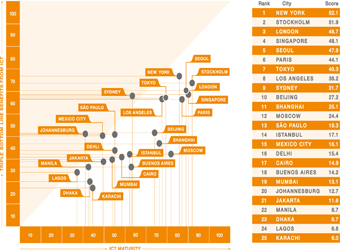Ericsson has placed Cairo on its latest Networked Society City Index report draws a correlation between ICT maturity and the ability to use ICT to benefit business. Ranked 17, Cairo was one of two Middle East cities included in the list, while New York, Stockholm and London took the top three positions.
The report lists some of the positive effects that ICT has on innovation and entrepreneurship. Firstly, ICT leads to an increased number of entrepreneurial opportunities. For example, it enables new product innovations such as music and video streaming, e-commerce and cloud services. Secondly, ICT improves access to markets – for example, by enabling entrepreneurs and specialized niche firms to reach larger geographical markets. Thirdly, ICT reduces the cost of transactions between firms – for example, by minimizing the need to be located geographically close to suppliers, partners and customers.
‘This report builds on our previous Networked Society City Index reports to examine how ICT can benefit a city and its citizens from an economic, social and environmental perspective,’ said Anders Lindblad, President, Ericsson Region Middle East and North Africa. ‘The report delivers excellent insights into how change mechanisms in cities such as Cairo can be leveraged to help future generations create positive triple bottom line benefits for society.’
The positive correlation between ICT maturity and economic development is widely supported by numerous academic reports and case studies. For example, data issued by Ericsson earlier this year showed that quadrupling the speed of broadband in Egypt has the potential to contribute an additional 0.6* percent or approximately USD1.377 billion, to the nation’s Gross Domestic Product (GDP).
Patrik Regårdh from Ericsson’s Networked Society Lab said: ‘We see the individual – rather than city institutions or businesses – as the drivers of development resulting from ICT maturity. Governments follow by adapting to citizens’ changing behavior, while businesses primarily adopt ICT innovations to increase internal efficiency. More importantly, government decisions help steer the business sector’s ICT development. Therefore, changes in policy, regulation and planning, paired with research and support for taking risks and funding, are some of the key factors for driving progress. These factors are crucial in helping organizations of all sizes to connect, collaborate and compete more effectively.’
Other cities included in the Index were: Beijing, Buenos Aires, Delhi, Dhaka, Istanbul, Jakarta, Johannesburg, Karachi, Lagos, Los Angeles, Manila, Mexico City, Moscow, Mumbai, Paris, São Paulo, Seoul, Shanghai, Singapore, Sydney and Tokyo. 28 indicators have been used to measure the total benefits in the index for each city: The indicators can be categorized into two dimensions: cities’ ICT maturity and benefits from ICT investments from both a social, economic and environmental point of view.
